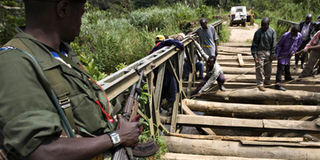Congo rebel force's website shut down

A fighter from the FDLR rebel group, being hunted by the Rwandan and Congolese armies, watches over civilians ordered to destroy a bridge at the village of Peti in eastern Congo, February 7, 2009. Photo/REUTERS
RWANDA, Wednesday
A British web-hosting firm Tuesday shut down internet and computer servers dedicated to a Hutu rebel force partially responsible for the 1994 Rwandan genocide, media has reported.
According to reports in both Germany and Rwanda, an investigation and letters sent by a German newspaper to a web-hosting service that published the website of the Democratic Forces for the Liberation of Rwanda (FDLR) led to a suspension of services.
It is the latest and most varied strike against the rebel group that is considered a terrorist organisation in Rwanda as well as the United States of America.
The website, www.FDLR.org, said on Wednesday that its servers would be down for a week ‘due to maintenance.’
The FDLR is a rebel force occupying pockets of eastern Democratic Republic of the Congo, across from Rwanda, but the rebel leadership lives in Germany.
The closure was first announced by German online newspaper TAZ, and the news was then republished in Rwanda’s pro-government daily The New Times.
“They have built in the Democratic Republic of Congo, a state within a state, heated the endless wars,” said TAZ’s Africa editor Dominic Johnson.
“Now, a simple enough request by TAZ on the server that maintains the FDLR page on the internet to take the website of the organisation from the net.”
In the war over history, ethnic narrative and political control, words have been a deadly weapon and the web a used tool for the Hutu rebels.
As rebel spokespersons and military officers have routinely capitulated to Rwanda, fled, and swapped cell-phone SIM cards, the internet has become the FDLR’s conduit of communication. The website was updated almost daily with press releases, reports, and historical documents.
For an ethnically-tinged genocidal rebel group, the website was a rare source of legitimacy.



